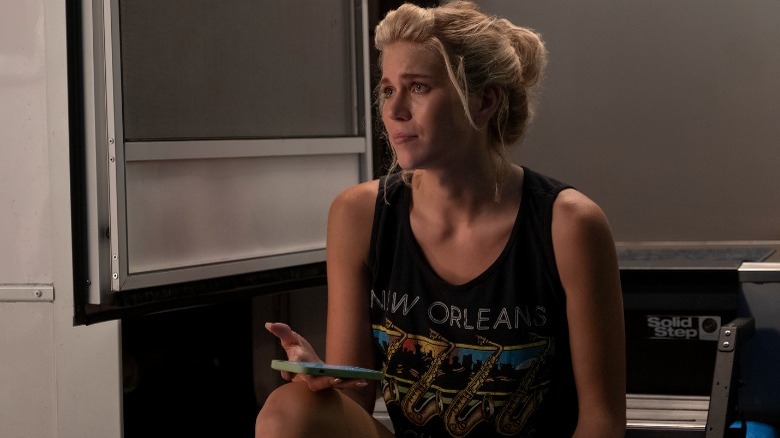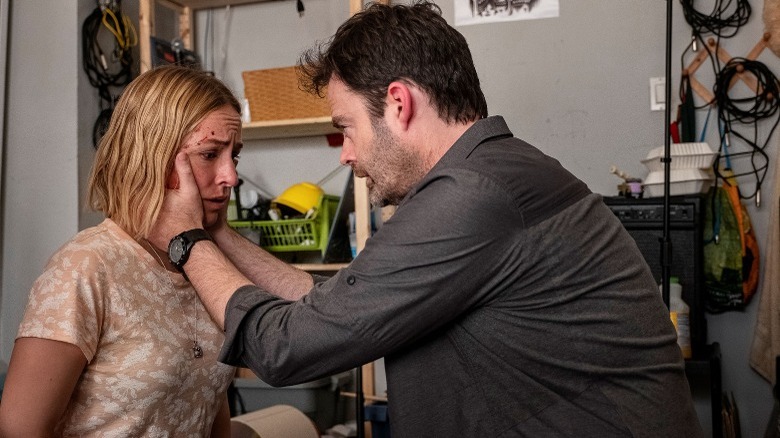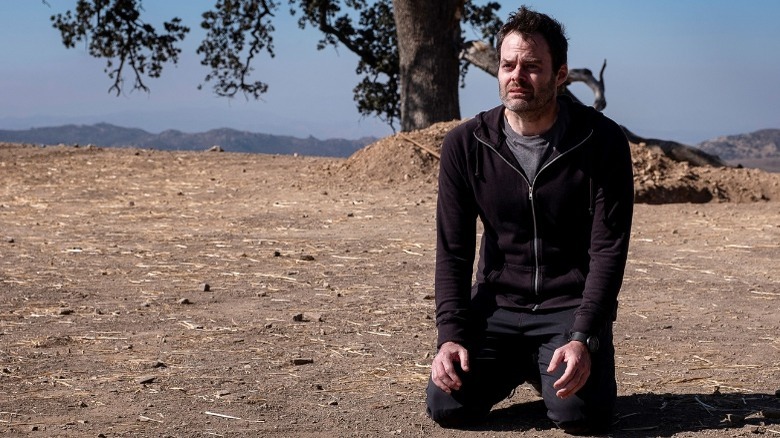Sally's Choice Is The Most Quietly Tragic Part Of An Extra-Dark Episode Of Barry
This post contains spoilers for the latest episode of "Barry," as well as sensitive, possibly triggering content.
The latest episode of the final season of "Barry" might be the show's darkest chapter yet. It's certainly among its most heartbreaking; there's the death of Cristobal (Michael Irby), and of Hank's (Anthony Carrigan) heart with him, a scene that unfolds with excruciating slowness and then, suddenly, all at once. There's the shooting of Gene's (Henry Winkler) son, a senseless, awful tragedy that happens to a character whose arc has always been defined by a tidy sense of dramatic irony. And there's Barry (Bill Hader), the black hole around which so many characters still orbit despite themselves.
None of these plots, however, hurt quite like Sally's (Sarah Goldberg). At first glance, Sally's storyline in the latest episode of "Barry" is nowhere near as gutting as the bleak twists of fate mentioned above. She visits the set of a Marvel-esque movie where she has what could be described as a "big break." When Kristen (Ellyn Jameson), the woman she's ostensibly coaching, chokes, Sally steps in and demonstrates her lines perfectly. It's an obvious gambit, but a successful one. As she heads back to her trailer, a male crew member assures her that he can get her great roles if she sticks with him. You can see Sally begin to shut down during this conversation; she's been chewed up and spit out by Hollywood before, and perhaps knows better than to get on the ride again.
'I'll be okay!'
That's not the sad part, though. Sally's arc is quietly heartbreaking because although she seems ready to call off her abusive relationship with Hollywood, she's eager to get back to an even more dangerous relationship — with Barry. When Kristen tells Sally her ex broke out of prison, a helicopter whir drowns out whatever other words of support she might be offering. Sally doesn't look scared but rather stunned, then contemplative. She tilts a little as she stands, as if she might fall over, but then she says, "Uh, I'll be okay!" We don't see Sally for roughly the next ten minutes of the episode, but when we do, she's rushing into her apartment, eager to discover that Barry has broken in.
Sally's decision here is made silently and swiftly. There's no begging as in Hank and Cristobal's goodbye. There's no beautifully choreographed action scene or sudden violence to signal to viewers that s**t has just gotten real. We're given just a few seconds of Goldberg's face to show that, even as she reels from the news of Barry's prison escape, she welcomes it. She wasn't lying when she said she felt safe with him, or if she was, she still at the very least feels better with him than she does on set or with the suffocating judgment of her parents. "Barry" has spent four seasons crafting a story about Sally's status as an abuse survivor, and in a matter of minutes, the show sees Sally blow up her life to be with a dangerous, angry man. In any other series, we would be cheering for the long-time love interest to choose the protagonist; this time, we'd be forgiven for crying.
A relationship wordlessly breaks down
"Barry" didn't always look like a story about abuse, but Hader and co-creator Alec Berg have been fueled throughout its run by a clear need for perpetual motion — a constant, ambitious evolution of Barry as a character and the series as a whole. Viewers have known about Sally's history as an abuse survivor from early on, back when Barry still maintained a somewhat likable persona when he wasn't killing people. By season three, though, the cracks were starting to show.
One of my favorite shots in that season is the one in which Sally makes a plate of food for Barry, cracks open a beer, and anxiously gets a video game console situated for her boyfriend. It's a response that comes over Sally like muscle memory in action, but it's also clearly a holdover from a past relationship; a few scenes before, Barry screamed in Sally's face at work, and his verbal and emotional abuse triggered her into a return to the peacekeeping behavior that kept her safe in the past. There are no lines in the script to explain all this then, either. "Barry" tells us about the sorry state of the pair's relationship entirely through its visuals and Goldberg's performance.
There's a term used in trauma therapy and psychology called "revictimization." It refers to the tendency for people who have experienced abuse once to be exposed to it again, at the hands of someone else. There are complex factors that can contribute to survivors' likelihood of experiencing revictimization, but none of them are the fault of the abused party. Regardless of the reasoning, research shows that people who assault or abuse are at a higher risk of experiencing it again later in life.
Revictimization and the cycle of abuse
Abuse survivors are also likely to return to their abusers after leaving, in large part because the cycle of abuse makes them feel isolated and dependent on their abuser, or confident that the abuser is actually a safe or "good" person. While Barry perhaps isn't shown as a typical abuser — we only saw how erratic and threatening he could act in the midst of a breakdown beginning in season 3 — we did actually see Sally attempt to leave him before. In last season's finale, after he proposes a horrifying plan to terrorize her former colleague, she tells him to get out of her house. Only, Sally is attacked right after that, and the fact that Barry helps "save" her from her attacker (by covering up his death) likely makes her feel bonded to him once more.
The tendency for victim-blaming in these situations is high, and in the case of "Barry," a show that bucks our expectations at every turn by making its protagonist its villain, fans have actually blamed Sally for dumping Barry. "Yeah, she's a little narcissistic and she can be selfish," Berg said in an interview with IndieWire after the season 3 finale, "[But] he's a murderer — why are you worried about Barry in this relationship?" It's not just Sally who's been swayed by the illusion that Barry's a good guy; audiences have fallen for it, too, looking past the biggest red flags imaginable or justifying the character's actions long after they became unforgivable.
Barry is not safe
We can't know exactly what Sally was thinking when she returned to Barry this episode, proposing the pair leave town together. We can't know if she felt like she was out of other options, or if she truly saw him as a safe bet, although Goldberg says she thinks Sally felt some safety in being witnessed at her worst and not judged by Barry. We can't know whether Sally feels upset about being drawn to another angry man, or whether she's well aware of the complexities of revictimization. We can't even know if her moment of resolve on set may have been an acceptance of danger — an evaluation of every possible bad outcome, including her own possible death, that still inexplicably led her back to Barry.
So what do we know? We know that Barry is far from safe, and that Sally quietly makes a choice here that's both extremely upsetting and extremely common among abuse survivors. In nearly any other series, this type of reunion would feel like the start of a beacon of hope, and the start of a happy ending. In "Barry," it feels like heartbreak.
"Barry" airs on HBO and HBO Max on Sundays at 10pm ET.
If you or someone you know is dealing with domestic abuse, you can call the National Domestic Violence Hotline at 1−800−799−7233. You can also find more information, resources, and support at their website.




